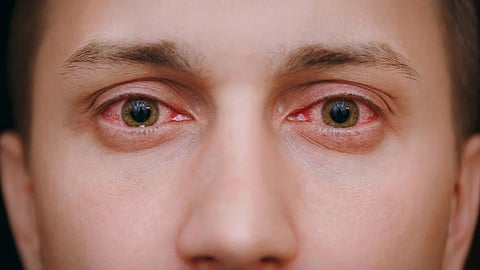

CHENNAI: “The incidence of conjunctivitis - popularly known as ‘Madras Eye’- is rising rapidly, especially among children, in Chennai. Every year, cases of conjunctivitis show a mild surge as the monsoon season comes to a close, this year the prolonged rainfall in the city has further increased the caseload. Nearly 90% of all conjunctivitis is caused by adenovirus. The affected eye is red, itchy, irritated, and gritty, and produces a watery discharge similar to tears. In some people, it quickly spreads to the second eye as well, we see around 500 patients with this problem every day in Chennai,” said Dr Srinivasan G Rao, Senior Ophthalmologist & Regional Head – Clinical Services, Dr Agarwal Eye Hospital, Chennai.
Conjunctivitis or Madras eye is a common condition that spreads rapidly from one person to another. It is often caused by a bacterial or viral infection. Conjunctivitis spreads through secretions from the eye. Thus, if a person touches his/her eye, he/she can pass on the infective virus or bacteria to another person or object that comes in contact with the secretion. But Allergic conjunctivitis and conjunctivitis due to chemicals or irritants but which does not spread from person to person.
The common symptoms of conjunctivitis are irritation, watering, red eyes, sticky discharge, and sensitivity to light. But when the cornea - the layer on the black part of the eye - is infected, it can result in blurred vision. The contagious viral infection, which causes swelling and inflammation among some patients, has been taking longer to heal.
He said that though conjunctivitis is usually a minor eye infection, it can develop into a more serious problem, if not diagnosed correctly and treated promptly. Many come after trying antibiotics from the drug store. Patients should avoid self-medication, over the counter eye drops and only use prescribed antibiotics, eye drops by an eye specialist after correct diagnosis.
He added that conjunctivitis is a highly contagious infection. It can easily spread from one person to another by personal belongings like towels, pillow covers, and makeup items. Hence isolation of patients is important. Infected patients should only use paper napkins to wipe out any discharge from their eyes and dispose the napkins immediately. They should discard old contact lenses and start using the new ones only after consulting the doctors. Patients should not use regular, reusable handkerchiefs. They should wash their hands frequently and should not let others use their personal belongings to prevent the contagion.
Since conjunctivitis spreads rapidly in closed environments like schools and offices, people should not venture out until the watery discharge is completely stopped.
Visit news.dtnext.in to explore our interactive epaper!
Download the DT Next app for more exciting features!
Click here for iOS
Click here for Android